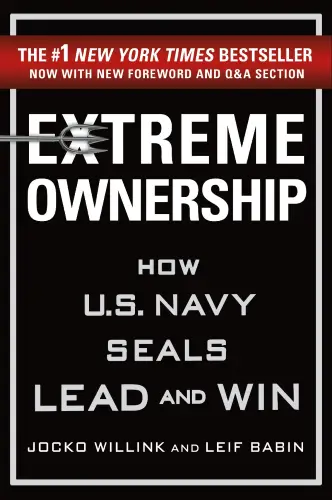Extreme Ownership
Book Author: Jocko Willink, Leif Babin
Summary reviewed by:
Terrence Timmons
Terrence Timmons
Analyst
Bachelor of Arts (BA), University Of California, Santa Barbara 2019
With over 4 years of experience as an analyst. Terrence Timmons is committed to analyzing summaries without compromising on quality.
Extreme Ownership: Summary
War on the battlefield and in the boardroom demands the same core principle: Extreme Ownership.
This isn't just another leadership theory; it's a battle-tested blueprint derived from the harrowing experiences of two Navy SEAL officers, Jocko Willink and Leif Babin, who led the most highly decorated special operations unit of the Iraq War. Their main thesis is simple yet profound: leaders must own everything in their world. There's no space for excuses, no room for blame. The credibility of the book is anchored in Willink's and Babin's extensive combat experience, which not only demonstrates their expertise but also embodies the essence of leadership under pressure.
The book stands out for its pragmatic approach to problem-solving and personal development. It steers clear of abstract concepts, focusing instead on actionable strategies that can transform both leaders and teams. Through a compelling narrative, Willink and Babin articulate the connection between military strategies and business challenges, making their insights universally applicable. They advocate for a leadership model that encourages accountability, discipline, and a mindset of continuous improvement.
One of the core strategies of Extreme Ownership is decentralized command, which empowers team members to make decisions and take action. This approach is illustrated through various scenarios where SEAL teams faced complex, dynamic environments that required swift, decisive action. Another key strategy is the "cover and move" principle, which emphasizes teamwork and mutual support to achieve objectives. The book is replete with practical steps, including setting clear goals, executing with discipline, and debriefing to learn from every outcome.
Willink and Babin extend their military wisdom to everyday situations, offering tools and exercises that guide readers in applying Extreme Ownership principles. Whether it's managing a project, leading a team, or navigating personal challenges, the book provides a framework for achieving success through responsibility, clarity, and leadership. By embracing Extreme Ownership, readers are equipped to lead with confidence, overcome obstacles, and achieve their goals.
Extreme Ownership: Genres
Non-fiction
Business & Management
Leadership
Military History
Personal Development
Self-Help
Military
Extreme Ownership: Themes
Extreme Ownership: The cornerstone of the book is the concept of taking complete responsibility for everything that happens under your watch. This includes success, failures, and everything in between. Willink and Babin present this through various combat stories, such as when Willink takes responsibility for a botched operation, illustrating the importance of this concept.
Leadership Dichotomy: The book talks about striking a balance between extremes, such as being a leader and a follower, being confident but not cocky, and others. Each dichotomy is explained with a relevant anecdote, like Babin’s struggle to balance aggression with restraint during a dangerous operation.
Importance of Teamwork: The authors emphasize that no mission can be completed without a dedicated team. They explore how to create, maintain, and lead effective teams, shown through various examples from their time in the SEALs.
Planning and Execution: Willink and Babin discuss the importance of detailed planning and decisive execution in achieving objectives. They highlight the necessity of ‘prioritizing and executing’ – focusing on the highest priority task, completing it, and then moving on to the next. This is aptly illustrated by the ‘Cover and Move’ principle where they draw parallels between the battlefield strategy and business strategy emphasizing mutual support within a team.
Leading Up and Down the Chain of Command: The authors emphasize the importance of leading in all directions within an organization. This means being able to lead superiors, peers, and subordinates effectively, which is necessary for the organization to operate smoothly. For instance, they share an incident when a lack of explicit communication led to a failed mission, underscoring the importance of clear, precise communication.
Decentralized Command: Willink and Babin stress that leaders must not micromanage, but instead empower team members to lead in their areas of responsibility. They explain this through the principle of ‘Decentralized Command,’ citing their experiences where effective decentralization played a key role in successful missions.
Discipline Equals Freedom: The book wraps up with the principle that maintaining a disciplined standard in all aspects of life leads to more freedom and success. Discipline, to Willink and Babin, is not restrictive but liberating, and they share personal examples from their military careers and personal lives to illustrate this theme.
Extreme Ownership: Methodology
In synthesizing the essence of "Extreme Ownership" into a digestible summary, we honed in on elements that resonate deeply with our readers—practical application, expert analysis, and quality and integrity. Our team, armed with a keen understanding of literature and a commitment to extracting actionable insights, meticulously dissected the book's key themes such as Extreme Ownership, Decentralized Command, and Discipline Equals Freedom. By doing so, we provided not just an overview but a toolkit for applying these principles in real-world scenarios. Our focus remained steadfast on delivering a summary that is both accurate and engaging, ensuring that every word reflects the book's powerful message and potential impact on your leadership journey.


Extreme Ownership
Date Published: October 20, 2015
Disclaimer: As an Amazon Associate I earn from qualifying purchases.




